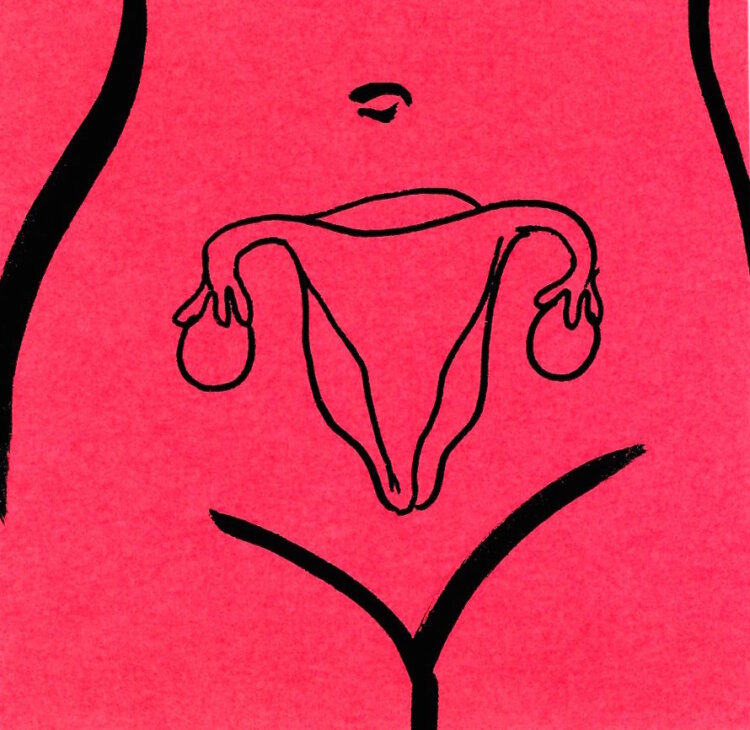
When I turned 30 last year, I decided to learn more about what’s wrong with me by spending the year asking a LOT of other people what’s wrong with them for my podcast. Turns out, none of us are perfect and all of us are broken!
Also during that year, as the endometriosis-ridden, clinically-depressed, hearing-impaired gal that I am, I started digging even deeper into menstrual health, leading me to write this article about sexual health education, sparking a LOT of awesome conversations with all of you on Facebook.
So now, we’re going to dive into a few topics relating to sexual and reproductive health that you brought up in the comments, and work toward debunking this idea of “normal.”
Because there is no “normal,” and if there were, it’d be super-boring anyway.
Here are four “abnormalities” that occur more widely than you might think.
Endometriosis
What is it? According to the CDC: “Endometriosis is when the kind of tissue that normally lines the uterus grows somewhere else. It can grow on the ovaries, behind the uterus, on the bowels, or on the bladder. Rarely, it grows in other parts of the body.” It can cause infertility, and very heavy periods. According to me: It’s a massive pain in the… uterus. I had a laparoscopy when I was 16 (a procedure where they essentially plug into your belly button and pump your abdomen full of air so that they have space to work internally – like a morbid circus tent – then they make a couple other tiny incisions and go in with little tools and cauterize excess tissue).
How prevalent is it? Prevalence of chronic endometritis is just shy of 25%, meaning about ¼ uterus-owning folks are dealing with it.
How do I know if I have it? Unfortunately it’s not super-easy to diagnose. Some women have no symptoms their whole lives, and don’t find out until they have trouble getting pregnant.
How do I treat it? If you have super-heavy periods and extreme pain, then chat with your doctor in general about your cycle, and specifically about endometriosis, as well as any potential treatment options.
HPV
What is it? HPV (short for human papillomavirus) is a sexually-transmitted virus that can cause genital warts, and some strains of the virus can also lead to certain types of cancers in both males and females. It usually goes away on its own and most often does not cause health problems; but when HPV does not go away, it can result in cervical, genital or oropharyngeal cancer, genital warts, and recurrent respiratory papillomatosis (a rare condition where warts grow in the respiratory tract). Unfortunately, because HPV often has no signs or symptoms, many people who have the virus don’t even know it.
How prevalent is it? HPV wins the award for the world’s most common STI (sexually transmitted infection)! 🏆About half of all sexually active men and 80% of women will get at least one type of HPV at some point in their lifetime.
How do I know if I have it? There is a blood test for this one! There’s also a vaccine now for people ages 8-26 that helps prevent most strains of HPV (recommended before a person becomes sexually active and potentially exposed to the virus). Most people with STIs and STDs (sexually transmitted diseases) have no idea they have them! For pretty much all of them – HPV, Herpes, Chlamydia, Gonorrhea – if you contract the virus, even if you show no symptoms, you can still spread it to other people. Literally the *only* way to know for sure, is a blood test.
How can I treat it? Unfortunately, there is no treatment for most adults with HPV. However, it is important to ask your doctor to get tested if you are sexually active, and also to be honest with potential partners about your status. You may also have to deal with the fact that having an STI or STD sometimes comes with a massively overblown stigma. But instead of freaking out, appreciate this condition as a newly acquired douchebag buffer: if someone judges you for it, then that’s a sure sign they’re not worth your time, nor are they emotionally responsible enough to take care of your heart.
Polycystic Ovary Syndrome (PCOS)
What is it? Caused by a hormonal imbalance when ovaries or adrenal glands produce more testosterone than normal, PCOS results in a series of cysts (fluid-filled sacs that hurt like hell when ruptured) on the ovaries. It throws the menstrual cycle out of whack, resulting in irregular periods, or even no period at all.
How prevalent is it? Millions of women are living with PCOS without knowing it. It’s the most common cause of infertility; one in ten women of childbearing age are affected but fewer than half of them are actually diagnosed.
How do I know if I have it? Unfortunately, there’s no test to definitively diagnose PCOS. Symptoms may include: Pelvic pain, excess hair growth on the face, chest, stomach, thumbs, or toes, baldness or thinning hair, acne, oily skin, or dandruff, and patches of thickened dark brown or black skin.
How can I treat it? Have a good long chat with your doctor. Treatment focuses on managing individual concerns, like infertility, hair growth, acne or obesity, and can also involve lifestyle changes, or medication to regulate the cycle. In certain cases, doctors may recommend different types of surgery to treat PCOS.
Uterine Fibroids
What are they? Also called leiomyomas or myomas, uterine fibroids are growths in the uterus. They range in size from tiny and undetectable by the human eye, to bulky masses that enlarge the uterus, single fibroids or multiples. In extreme cases, fibroids can expand the uterus so much that it reaches the rib cage. Doctors don’t know for sure what causes them, but genetics, hormone changes, and insulin might be factors.
How prevalent is it? A lot of women have uterine fibroids at some point in their lives, but most don’t know they have them because they’re not often medically problematic.
How do I know if I have it? Although they usually aren’t dangerous, they can cause discomfort or lead to anemia from heavy blood loss. So if you have heavy menstrual bleeding, periods lasting more than a week, pelvic pressure or pain, frequent or difficulty with urination, constipation, and/or backaches or leg pains – chat with a doctor.
How can I treat it? There are both medical (hormonal) and surgical treatments for problematic fibroids. Your doctor is the best source of information on what treatment will be most effective for you.
So, my beautiful, broken friends, please remember two things:
- Until the world catches up with sci-fi TV shows, we only get one body, and a lot of the really bad stuff is preventable. So go see your doctor. Doctors are used to these types of questions. If they try to rush you outta there? Don’t let them: just keep asking your questions. If it helps, you can picture me standing over their shoulder saying things like “THAT’S RIGHT. WE’RE GONNA TAKE FIVE MORE MINUTES OF YOUR TIME, DOC. DEAL WITH IT.”
- We are all human. Just adorable, vulnerable little sacks of flesh, bones, and emotion, running around the world, bumping into each other, hoping for the best. Sometimes, shit is gonna happen. But having any of these issues is nothing to be ashamed about – any of these conditions may be a part of you, but doesn’t necessarily define you.
What other questions do you have about your bodies? What should we discuss next? Reach out to me on Twitter, Instagram, or leave a comment below.
Want more? Yeah you do! Additional reading:
Sources:
http://www.who.int/life-course/news/commentaries/2015-intl-womens-day/en/
https://www.self.com/story/top-causes-of-infertility-in-women
https://www.cdc.gov/reproductivehealth/womensrh/healthconcerns.html
https://www.womenshealth.gov/a-z-topics/human-papillomavirus
http://www.rbmojournal.com/article/S1472-6483(17)30456-X/abstract


Grok Nation Comment Policy
We welcome thoughtful, grokky comments—keep your negativity and spam to yourself. Please read our Comment Policy before commenting.